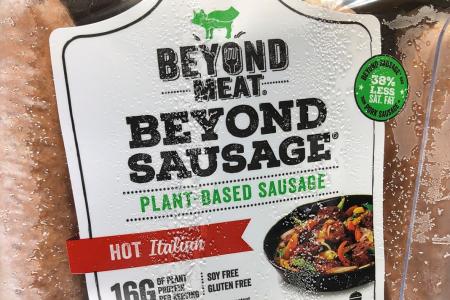Alternative protein sector gains traction
Your next steak may come from a 3D printer or use volcanic microbes
ROME It may sound like science fiction, but in a few years the family dinner table may be laden with steak from a printer and other proteins produced from air, methane or volcanic microbes.
With the explosive success of vegan beef and burger substitutes developed by Beyond Meat and Impossible Foods, the alternative protein sector just keeps growing.
Enter Solar Foods, a Finnish company working on an edible protein powder called Solein which uses water, air and renewable electricity as a way to separate food production from agriculture.
"You avoid land use impacts like clearing forests for agriculture, use of pesticides and use of fertilisers that release greenhouse gases and so on," co-founder and chief executive Pasi Vainikka told the Thomson Reuters Foundation.
Solein is made by putting microbes into a liquid and feeding them small bubbles of hydrogen and carbon dioxide, a process similar to making beer or wine, apart from the lack of grapes or grains, Mr Vainikka explained.
As the liquid thickens, it is dried into a very fine powder which is about 65 per cent protein and tastes like wheat flour.
In September, Solar Foods struck an agreement with Nordic food company Fazer to develop products using Solein, which can be used in existing plant-based products or future offerings such as lab-grown meat.
Solein will cost about 5 euros (S$7.50) a kilo to produce and will hit the market by 2021, Mr Vainikka said.
FERMENTATION
Another company tackling agriculture's emissions through fermentation is in India. The Bangalore-based String Bio, is working to convert methane, a greenhouse gas more potent than carbon dioxide as it traps 28 times more heat, from waste and natural sources into protein powder - initially for animals.
"We said this is probably the best impact we humans can have in this world, where we take something that we don't need for the environment and convert it into something we do need," said Mr Vinod Kumar, who with his wife Ezhil Subbian set up the company.
Such environmental considerations, along with concerns over animal welfare and human health, have driven both demand and supply of alternative proteins, said Mr Dan Altschuler Malek, managing partner at investment firm Unovis Partners.
Just 10 years ago, he said, retailers saw alternative proteins as a risky bet, but "today they realise there is a huge demand for all these products".
Unovis manages New Crop Capital, a fund that invests exclusively in start-ups developing meat, seafood and dairy replacements, including Beyond Meat.
New Crop has also invested in Nova Meats, a Spanish company that uses a special 3D printer to produce steak that can mimic the taste and texture of meat.
The printers produce three-dimensional vegan steaks using cartridge-style syringes which extrude plant-based proteins.
VOLCANOES AND TINY ORGANISMS
The new-generation proteins are also less processed, said Mr Thomas Jonas, CEO of Nature's Fynd, whose protein is based on microbes found in volcanic hot springs at Yellowstone National Park.
In that barren, other-worldly and dangerous landscape, researchers "discovered a bunch of life forms that across millennia evolved to survive in this environment", he said.
Having raised US$33 million (S$44.8 million) in February, the company plans to produce "a hamburger equivalent" next year through a "novel fermentation" of the microbes.
For investors like Mr Altschuler Malek, alternative proteins are all about options for consumers, with three essential caveats.
"It needs to taste great, it needs to meet certain price points and it needs to be able to be manufactured in large volume," he said.- REUTERS
This article has been amended for clarity.
Get The New Paper on your phone with the free TNP app. Download from the Apple App Store or Google Play Store now



